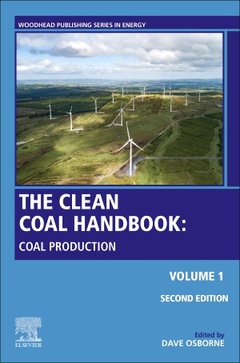The Coal Handbook (2nd Ed.) Volume 1: Towards Cleaner Coal Supply Chains Woodhead Publishing Series in Energy Series
Coordonnateur : Osborne Dave

In addition, the book includes two brand new chapters on the optimization of mine development and the impacts of tailings treatment. With its distinguished editor and international team of expert contributors, the book is a comprehensive and invaluable resource for professionals in the coal mining, preparation and utilization industry, those in the power sector, including plant operators and engineers, and researchers and academics interested in this field.
Part I 1. Coal formation 2. Coal petrography 3. Coal resources and reserves 4. Coal sampling 5. Coal analysis 6. Aspects of surface chemistry of coal and its characterization in fine coal processing 7. Overview of Industrial Utilization of coal
Part II 8. Advances in coal mining technology 9. Underground coal gasification 10. Coal Preparation fundamentals 11. Coal comminution and sizing 12. Cleaning of coarse and small coal 13. Cleaning of fine and ultrafine coal 14. Solid-liquid separation technologies for coal 15. Treatment of coal tailings 16. Economic factors affecting coal preparation plant design worldwide
Part III 17. Optimization, simulation and control of coal preparation plants 18. Supply chain management for bulk materials in the coal industry 19. Coal conveying 20. Coal handling aling the supply chain 21. Transportation by rail and sea in the coal industry
- Reflects the latest knowledge on coal production supply chains, from analysis to extraction and distribution
- Explores sustainable coal characterization, formation, petrography, reserves, sampling and analysis
- Examines coal extraction and preparation and highlights advances in coal mining technology, underground coal gas extraction, coal sizing, comminution and cleaning, and solid-liquid separation technologies
- Includes two brand new chapters on Optimization and Strategies in Mine Development and The Impacts of Tailings Treatment Obligations
Date de parution : 03-2023
Ouvrage de 848 p.
15.2x22.8 cm
Thème de The Coal Handbook :
Mots-clés :
?Accuracy; Analysis; Anthracite; Artificial intelligence; Asset management; Automation; Belt conveying; Bias; Bituminous; Bituminous coal; Blockchain; Breakers; Bulk shipping terminal; CRIRSCO code; Cement and carbon (climate change) management; Centrifugation; Centrifuge; Cleaning; Coagulation; Coal; Coal chemistry; Coal cleaning circuit optimization; Coal flotation; Coal mining; Coal petrography; Coal preparation; Coal properties; Coal rank; Coal reserves; Coal resources; Coal shipping; Coal tailings; Coal type; Coal utilization; Coal washability; Coal-processing equipment selection; Coal-to-liquids (CTL); Coal-water slurries; Coalification; Coarse coal only cleaning plants; Coking coal circuit design; Column flotation; Communication system; Constituents of coal; Continual improvement; Conveyor technology; Crushing; Desliming circuits; Dewatering; Distributional heterogeneity; Dry coal cleaning; Dry separation technologies; Drying; Dust extinction moisture level; Energy; Enhanced gravity separators; Equiprobable sampling; Extraction; Filter; Filtration; Financial margin maximization; Fine coal; Fine coal dewatering technologies; Fine coal handleability; Fine gravity separators; Flocculation; Flowsheets; Forecasting; Froth flotation; Good sampling; Hammermills; In-pit crushing and conveying; In-pit tailings storage facility; Incremental quality; Intrinsic heterogeneity; Inventory management; Iron and steel; JORC code; LIMS; Laboratory tests; Land-to-sea interface; Liberation of coal; Lignite; Logistics; Longwall; Macerals; Magnetite dense media; Material handling; Mechanical sampler; Metallurgical (coking); Mine; Minerals; Modeling; Modern coal petrographic techniques; Oil agglomeration; Optimization; Panama Canal ships and sizes; Partition simulation; Pelletization; Plant control



